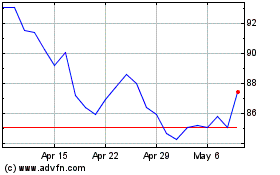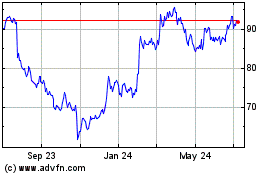Edwards Life's Valve Data To Highlight Upcoming Heart Meeting
March 21 2012 - 12:39PM
Dow Jones News
New data on a catheter-delivered heart valve marketed by Edwards
Lifesciences Corp. (EW) will be presented at a medical meeting this
week, providing key clues on the device's potential market size in
the U.S.
The data will be discussed at one of hundreds of sessions at the
American College of Cardiology's annual conference, which runs from
Saturday to Tuesday in Chicago. Other items to watch include data
on Merck & Co.'s (MRK) antiplatelet drug vorapaxar and an
anticlotting drug co-marketed by Bayer AG (BAYRY, BAYN.XE) and
Johnson & Johnson (JNJ).
So far, Edwards's Sapien device has been approved by the U.S.
Food and Drug Administration for inoperable patients, but the
Irvine, Calif., company is trying to expand the market to patients
at high risk for surgery. Two-year data on those patients is key to
watch at the conference as the company seeks to gain FDA approval
for the group later this year.
On its most recent post-earnings conference call, Edwards said
it expects 2012 world-wide sales of its catheter-delivered heart
valves to increase 70% to 90% to $560 million to $630 million,
assuming Sapien is approved for high-risk patients in the U.S.
mid-year.
According to J.P. Morgan Chase & Co., FDA approval for the
high-risk group would add 2,000 to 2,500 patients a year receiving
Sapien. While an incremental step to its current market of 22,000
inoperable patients, the research firm said, failure to gain
approval would call into question Edwards's ability to broaden the
market for the device to healthier patients down the road,
considered a more lucrative opportunity.
Sapien treats patients with severe narrowing of the aortic
valve. The condition can lead to symptoms such as fatigue,
dizziness and serious heart problems. About 300,000 patients in the
U.S. have a sufficiently severe condition as to require an
artificial valve replacement, which is done through hours-long
heart surgery. Catheter-delivered heart valves, a less-invasive
alternative to surgery, are considered to have multibillion-dollar
market potential.
The data to be presented Monday are part of Edwards's key
"Partner" study used to gather evidence for the company's Sapien
valves in the U.S. The company's one-year data on high-risk
patients, presented at last year's conference, showed that patients
treated with catheter-delivered valves were at least as likely to
survive a year as patients treated through open-heart surgery but
were more likely to suffer strokes.
Mortality rates and stroke rates in patients treated with the
valve compared with those receiving surgery will be key to watch.
If patients receiving Sapien continue to experience higher rates of
stroke, "it could raise concerns that this neurological risk
compounds over time," J.P. Morgan's Michael Weinstein said.
The conference also will feature sessions on wiring problems in
some of St. Jude Medical Inc.'s (STJ) implantable defibrillators, a
key business for the company. The problems have involved cables no
longer on the market, but there have been questions on whether they
could affect other cables that St. Jude sells.
With this week's conference and a separate medical meeting in
May, "we only expect the scrutiny to grow," said Raj Denhoy,
analyst at Jefferies & Co.
On the pharmaceutical side, several notable studies on
approaches to cardiovascular treatment will be featured at the
meeting, including:
--Full results Saturday from Merck's "TRA-2P" study of an
experimental antiplatelet agent, vorapaxar. Merck said last month
that the drug met the study's primary efficacy goal of reducing
risk of heart attacks and related events in people with a history
of cardiovascular disease but significantly increased bleeding
risk.
The full results will show the magnitude of the drug's efficacy
and safety risks, shedding light on whether it has a chance of
reaching the market. Merck and analysts have already reduced their
expectations for the drug's potential because of the bleeding risk,
especially those patients with a history of stroke.
--Results Monday of the "Einstein PE" study of Xarelto, an
anti-clotting drug co-marketed by Bayer and Johnson & Johnson.
This study compared Xarelto with another drug regimen including
enoxaparin in preventing certain blood clots in patients with a
condition called pulmonary embolism. Positive results could lead to
expanded use of the drug, which is currently approved to reduce
risk of stroke in patients with a heart-rhythm disorder called
atrial fibrillation, and to prevent certain clots in knee or hip
replacement surgery.
--Results Monday of a study testing an experimental
cholesterol-lowering drug co-developed by Regeneron Pharmaceuticals
Inc. (REGN) and Sanofi SA (SAN.FR). The drug, code-named
REGN727/SAR236553, is a fully human monoclonal antibody that binds
to a protein called PCSK9, and has the potential to significantly
lower bad cholesterol levels. Analysts say this class of PCSK9
drugs, which includes one being developed by Amgen Inc. (AMGN), has
big market potential if the drugs are successful in further
clinical studies and clear regulatory hurdles.
--By Anjali Athavaley and Peter Loftus, Dow Jones Newswires;
212-416-4912; anjali.athavaley@dowjones.com
Edwards Lifesciences (NYSE:EW)
Historical Stock Chart
From Mar 2024 to Apr 2024

Edwards Lifesciences (NYSE:EW)
Historical Stock Chart
From Apr 2023 to Apr 2024
